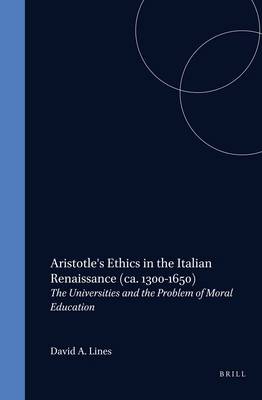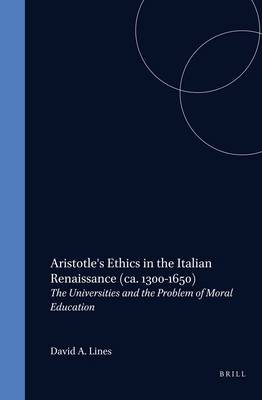
- Afhalen na 1 uur in een winkel met voorraad
- Gratis thuislevering in België vanaf € 30
- Ruim aanbod met 7 miljoen producten
- Afhalen na 1 uur in een winkel met voorraad
- Gratis thuislevering in België vanaf € 30
- Ruim aanbod met 7 miljoen producten
Zoeken
Aristotle's Ethics in the Italian Renaissance (Ca. 1300-1650)
The Universities and the Problem of Moral Education
David Lines
€ 415,45
+ 830 punten
Omschrijving
This volume studies the teaching of Aristotle's Nichomachean Ethics (the standard textbook for moral philosophy) in the universities of Renaissance Italy. Special attention is given to how university commentaries on the Ethics reflect developments in educational theory and practice and in humanist Aristotelianism.
After surveying the fortune of the Ethics in the Latin West to 1650 and the work's place in the universities, the discussion turns to Italian interpretations of the Ethics up to 1500 (Part Two) and then from 1500 to 1650 (Part Three).
The focus is on the universities of Florence-Pisa, Padua, Bologna, and Rome (including the Collegio Romano). Five substantial appendices document the institutional context of moral philosophy and the Latin interpretations of the Ethics during the Italian Renaissance.
Largely based on archival and unpublished sources, this study provides striking evidence for the continuing vitality of university Aristotelianism and for its fruitful interaction with humanism on the eve of the early modern era.
After surveying the fortune of the Ethics in the Latin West to 1650 and the work's place in the universities, the discussion turns to Italian interpretations of the Ethics up to 1500 (Part Two) and then from 1500 to 1650 (Part Three).
The focus is on the universities of Florence-Pisa, Padua, Bologna, and Rome (including the Collegio Romano). Five substantial appendices document the institutional context of moral philosophy and the Latin interpretations of the Ethics during the Italian Renaissance.
Largely based on archival and unpublished sources, this study provides striking evidence for the continuing vitality of university Aristotelianism and for its fruitful interaction with humanism on the eve of the early modern era.
Specificaties
Betrokkenen
- Auteur(s):
- Uitgeverij:
Inhoud
- Aantal bladzijden:
- 640
- Taal:
- Engels
- Reeks:
- Reeksnummer:
- nr. 13
Eigenschappen
- Productcode (EAN):
- 9789004120853
- Verschijningsdatum:
- 20/06/2002
- Uitvoering:
- Hardcover
- Formaat:
- Genaaid
- Afmetingen:
- 165 mm x 245 mm
- Gewicht:
- 1374 g

Alleen bij Standaard Boekhandel
+ 830 punten op je klantenkaart van Standaard Boekhandel
Beoordelingen
We publiceren alleen reviews die voldoen aan de voorwaarden voor reviews. Bekijk onze voorwaarden voor reviews.








